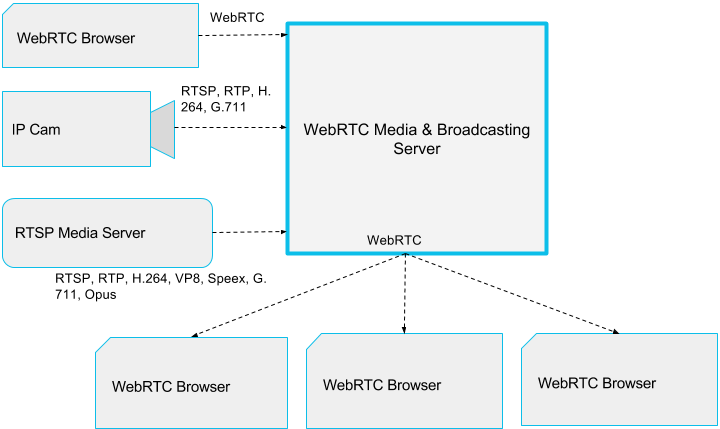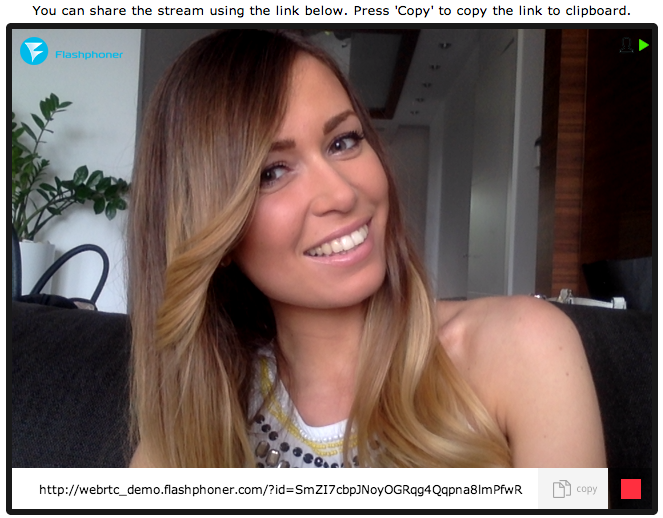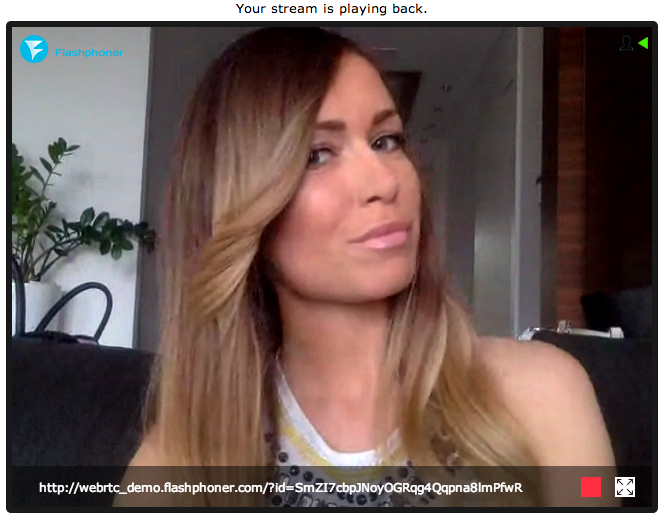
WebRTC Media & Broadcasting Server
Server-side software for online broadcasting via a browser, webinars, online lectures and other events based on broadcasting a videostream to an unlimited number of Internet spectators
Possible sources of audio- and videostream are a WebRTC browser plus a common web-camera, or a stationary professional IP-camera with RTSP support.
Other possible sources include media servers or any other RTSP devices supporting H.264, VP8 video codecs and G.711, Speex, Opus audio codecs.
FEATURES
- Audio codec support: G.711, Speex, Opus
- Video codec support: VP8, H.264
- Protocol support: RTSP, RTP, RTCP
- Browser tecnology support: WebRTC, HTML5 Websockets, Websockets SSL
WebRTC server operation diagram
WebRTC server installs on any Linux system, be that a home or office comupter, a server in a typical data-center rack, or even a virtual VPS-server.
After a server has been set up and is running, it can receive inbound audio and video streams and broadcast these streams in the ‘one-to-many’ format – one client publishes the stream, while many spectators watch it. Common examples of such an approach are webinars, lectures, online translations and other events that require direct live Internet broadcasting of a video stream.

Usage examples
Example №1: We can use any WebRTC compatible web browser as a source (Chrome, Mozilla, Opera, IE). Therefore, a video stream produced by a common web camera is redirected through a local WebRTC browser to a WebRTC server and is broadcast to other WebRTC browsers then.
Example №2: Other common example is using an IP-camera as a stream source. Unlike conventional web cameras, IP-cameras do not require connection to a computer, as they are able to transmit a video stream directly to the network using RTSP and RTP protocols and encoding the stream using H.264 and G.711 codecs. After that, the video obtained from the IP-camera is broadcasted to other browsers via WebRTC.
Example №3: You can also use a third-party RTSP-server as a source of a video stream. Server data are transferred to a WebRTC server and are broadcast through WebRTC. This way also allows “video on demand” broadcasting.
WebRTC video broadcasting
After WebRTC Media & Broadcasting Server is installed and configured, you can easily broadcast a WebRTC stream from your browser to an unlimited number of Internet users.
Here is a snapshot of a user interface taken from the side of the broadcaster. Below the footage you can find a web-link to that stream and the ‘Copy’ button to copy the link to the clipboard and share it with anyone else.
The next screenshot look very similar to the above one. The only difference is that it shows the interface from spectator’s side. It allows to pause the playback and switch to fullscreen.
More about WebRTC server
Learn more about WebRTC Server for a browser
based broadcasting
Learn
more about WebRTC Server for IP cameras and video surveillance systems
Read how to run a
browser-based WebRTC broadcasting
Read
how to set up video surveillance via WebRTC using an IP-camera an a VPS server
Learn more about the Web Call Server platform
Read the manual
Visit support forums
Download WebRTC Media Server
Download Web Call Server 5
System requirements: Linux x86_64, 1 core CPU, 2 Gb RAM, Java
Installation:
- wget https://flashphoner.com/download-wcs5.2-server.tar.gz
- Unpack and install using 'install.sh'
- Launch server using command 'service webcallserver start'
- Open the web interface https://host:8444 and activate your license
If you are using Amazon EC2, you don't need to download anything.
Related articles
iOS Safari 11 now supports WebRTC
Oh, latency, thou art a heartless bitch
Broadcast video stream from web page to Facebook and YouTube simultaneously
Deployment multiplayer webrtc technology broadcast with a web camera via server in 3 minutes
Related features
Broadcasting a WebRTC video stream with re-publishing as RTMP
Video broadcasting from the web camera of a browser or mobile device



